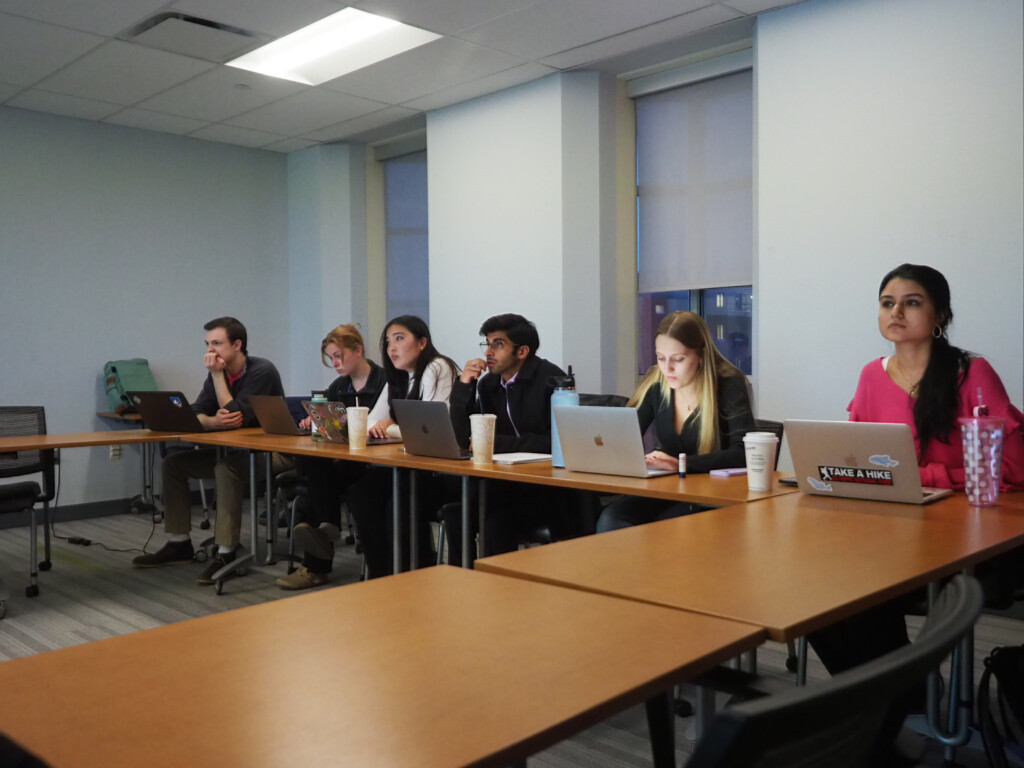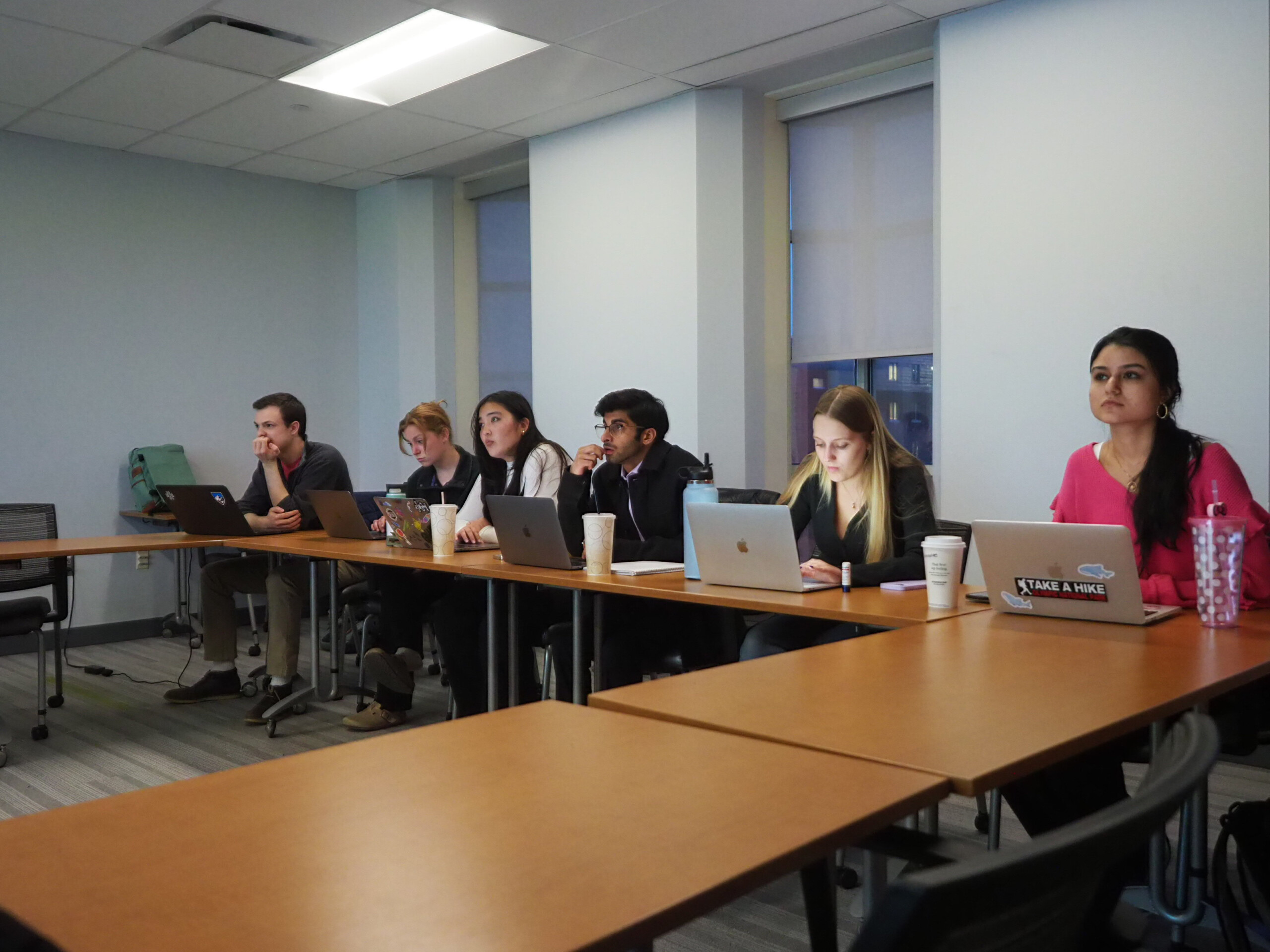If SA wants to hold a fair election, voting for SA President and Vice President should be postponed for another week.
While we here as the CT’s Editorial Board do not hold positions on SA, and you may not either, the events that have transpired prior to the start of voting have made waves beyond that of SA.
In comparison to the SA Senate, where there are fewer people running (13) than there are spots on the Senate (14; thus guaranteeing all a spot), there can only be one SA President and SA VP. Given that voting begins tomorrow and ends on April 4, voters now have minimal time to consider their options. Let’s break down why.
This past Tuesday, on March 28, the All-Campus Judicial Council (ACJC) heard the case Miraz Sadi v. Elections Violation Committee (EVC), where presidential candidate and junior Miraz Sadi was charged with violating election guidelines by allegedly initiating campaigning efforts for his ticket — consisting of him and his VP candidate, junior Mystie Parker — prior to the start of the official campaign period.
The primary evidence in question, a message sent by Sadi to an Instagram Direct Message group chat with 32 students, read, “Well let’s get this started,” and was sent on March 18 at 8:20 p.m., a week prior to the official public campaign period beginning on March 25 at noon.
The EVC cited the existence of this group chat as a breach of the Elections Policy and Procedure Manual’s clause that bans “campaigning action designed to appeal to multiple students when the candidate is not physically present.” To have the court rule in its favor, the EVC would have needed to demonstrate that Sadi and Parker’s outreach constituted premature campaigning and that “the Appellants acted with the intention of gaining votes.”
Sadi and Parker stated that their efforts were to be understood as recruiting what the rulebook refers to as campaign staff — not an election violation if that were the case, as candidates are permitted to plan campaigns and communicate with necessary staff year-round.
After a round of questioning, which involved discerning whether the appellants knew the 32 students in the group chat, the case found that “members of this group chat were chosen based on their personal connections and group affiliations” and that “they could all make valuable contributions to their campaign,” essentially qualifying the members in the chat as campaign staff as asserted by the candidates.
The court sided in favor of Sadi and Parker, deeming the EVC’s indictment of the pair “trying to gain support before the beginning of the campaign period” as “too vague” to equate with an “explicit request for votes in these direct messages.”
Although the Council sided with the appellants, the repercussions were set. From the five-day period between the charge date and the hearing, the Sadi/Parker ticket was prohibited from online campaigning — half of the campaign period.
In the aftermath of the Presidential Debate on March 30, Instagram story posts centered around Parker, who made negative statements about current SA members at the event, sparked lots of interest and gossip amongst the student body. Various SA members shared their thoughts on both the debate and their SA peers online, ranging from concern to outrage. This included a public back-and-forth between Parker and outgoing SA President and junior Adrija Bhattacharjee. The debate has over 3,500 views at the time of publication.
Sunday, a mere 13 hours before the first vote is scheduled to be cast, SA’s All-Campus Judicial Council (ACJC) held a hearing in Douglass 403 with the election hanging in the balance. The hearing centered upon allegations that first-year and VP candidate Elijah Bader-Gregory deceived the elections coordinator in an elections violation report he filed. The case has the potential to issue a 50 point violation to the campaign, which would disqualify them from the election cycle.
At the conclusion of the hearing, ACJC notified those in attendance that a decision would be reached within 72 hours. As of publication, polls will open without a verdict in the case, which could completely upend the election.
Being a bigwig in student government can be a precarious position to hold — especially if you’re the president of the student body. Juggling fighting for student initiatives alongside an administration that has way more say than you do as a student can make it feel near-impossible for any significant change to come to pass. Add on the fact that every presidential term is for a year only and that students are here for an average of four years each, and you’re set up with a recipe for potential chaos.
Despite these issues, every year, students run to be SA President and VP, and the lines for what to do and what not to do during that campaigning period can get blurred a lot — especially in scenarios like this.
It can be easy to view a student as just a politician, but as students, we all are bound to make mistakes and frustrate others — it’s something that even the most calm and collected adults suffer from. Whether it’s sniping at someone during a debate or being overly invested in a party’s success or failure or anything in between, the effects of such actions can seem petty and misguided from multiple perspectives (and well thought-out and grounded from others).
However, as representatives of the student body in a governmental setting, it is important for the candidates that are running for SA presidencies to be viewed via their platforms and not solely the skews of their character as displayed in a given video clip or story post. No candidate will be perfect, and voters should take into account the actions that candidates have taken during the election period to make a comprehensive decision.
As part of this comprehensive decision-making, all tickets should be judged based on their planned initiatives and campaigning. We owe it to all of the candidates, until further verdicts, to consider their campaigns equally. Thus, each campaign needs to be given at least the time allotted for campaigning (if not more, as a result of postponing the election) in order to properly convey their platforms.
To not give all candidates this predetermined amount of time could potentially skew student voters for or against tickets due to a lack of content and time themselves. This doesn’t mean that people will not be swayed by what was mentioned in these posts — and to be swayed by them is a valid stance to take as a voter.
In addition, especially with an impending ACJC decision leaving some tickets’ viability hanging in the balance, all student voters deserve to have their votes count effectively, rather than some of them potentially being rendered null and void due to the disqualification of a candidate (or requiring a revote anyway). Instead, by taking time for the situation to breathe and for the ACJC verdict to be reached, all parties — the candidates and the voters alike — can take time to collect their thoughts and approach the remainder of the election period with a less rushed mindset.
If the election continues — which it may — before you vote, take active time to look at the tickets’ platforms and see what you agree with. Your opinion may or may not change depending on what you look at, but as arbiters of the news, we implore you to take the time to inform yourself on what exactly you’re voting for. You deserve to make your decision with as much information, context, and consideration as possible.
The Editorial Board is a weekly Opinions article representing the view of the Campus Times. This piece was co-written by Editor-in-Chief Alyssa Koh, Publisher Sarah Woodams, Managing Editor Allie Tay, and Photo Editor Henry Litsky.


